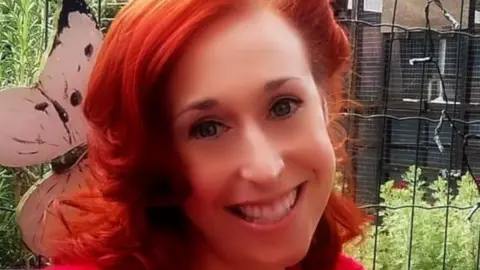Woman died from pneumonia as a result of anorexia
 Family photo
Family photoThe mother of a woman who died as a result of anorexia has said her daughter did not receive the care that she deserved.
Amy Ellis, from Broughton in Flintshire, died from pneumonia as a result of malnutrition in 2023, aged 43.
At an inquest into her death in Ruthin, the coroner read a statement from her mother Lyn Ellis, which said "people should be held accountable".
Betsi Cadwaladr health board described what happened as a "tragic case".
Former charity worker Ms Ellis had had eating disorders throughout her life, but when she was 38 she was diagnosed with a form of anorexia which caused her weight to plummet.
At the time of her death, she had been trying to raise £200,000 to fund specialist treatment in England which she was told was not available on the NHS.
The treatment involved a combination of cognitive and behavioural therapy as well as information on diet and body image support.
At the inquest on Friday, her mother said that her daughter was "determined to get better and begged the eating disorders team to fund inpatient care at the Priory clinic".
 Family photo
Family photoDr Samantha Sharpe from the Adult Eating Disorder Service at Betsi Cadwaladr Health Board (BCUHB) told the inquest that Ms Ellis had been referred to several agencies for help and offered appointments.
But "each time there was a reason why she couldn't attend", she said, even after appointments were rearranged.
Dr Sharpe said that she later wrote a latter to Ms Ellis, saying: "I don't think you're ready to engage but when you are please let us know."
She said funding had been agreed in 2019 for referral for inpatient treatment, but at that stage Ms Ellis did not want to be admitted to hospital.
Reaching a narrative conclusion, the coroner said Ms Ellis died from pneumonia related to malnutrition as a result of an eating disorder for which she was never successfully treated.
'A tragic case'
Speaking after the inquest, Dr Nick Lyons, BCUHB’s executive medical director, called it "a tragic case" and said "the thoughts and sympathies of myself and all colleagues who knew Amy are with her family and friends".
“We do provide highly specialist interventions and treatment for moderate to severe eating disorders, within our adult eating disorder service.
“Our multi-disciplinary teams’ prime consideration is always to match patients with the most appropriate care, including referral to specialist providers outside of north Wales where clinically appropriate.
“We welcome the coroner’s findings and where there are clear recommendations for service improvement we are committed to implementing them.”
If you have been affected by the issues raised in this article, help and support is available via the BBC Action Line.
